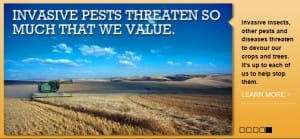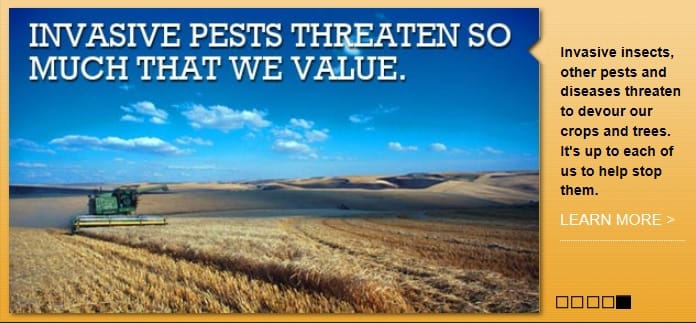USDA’s Campaign Anti-Hero, ‘Vin Vasive,’ Lends a Creepy Hand in New, Compelling Videos
 The USDA’s Animal and Plant Health Inspection Service (USDA-APHIS) is calling on the public to help stop the spread of 15 invasive species dubbed “Hungry Pests.” These non-native insects, other animals, plants and diseases could devastate America’s crops, trees and plants, and are often unknowingly spread through human actions. To help get the word out, USDA-APHIS is deploying its Hungry Pests’ anti-hero, Vin Vasive, in a series of eerie videos that debut in April during Invasive Plant Pest and Disease Awareness Month.
The USDA’s Animal and Plant Health Inspection Service (USDA-APHIS) is calling on the public to help stop the spread of 15 invasive species dubbed “Hungry Pests.” These non-native insects, other animals, plants and diseases could devastate America’s crops, trees and plants, and are often unknowingly spread through human actions. To help get the word out, USDA-APHIS is deploying its Hungry Pests’ anti-hero, Vin Vasive, in a series of eerie videos that debut in April during Invasive Plant Pest and Disease Awareness Month.
“Hungry Pests have a tremendous impact on our economy, environment and public health,” said Osama El-Lissy, deputy administrator of USDA-APHIS’ Plant Protection and Quarantine program. “They have already cost the U.S. billions of dollars and threaten many aspects of our everyday lives – from the food on our tables, to the forests we camp in, to the flowers in our gardens. When people are out hiking, gardening and traveling this spring and summer, we are asking them to be extra vigilant.”
El-Lissy added, “We think Vin Vasive and the videos will help drive home the messages about how people can help to ‘Leave Hungry Pests Behind.’”
With the public as a crucial line of defense against Hungry Pests, USDA-APHIS is asking everyone to take a few simple actions that can greatly reduce the spread of invasive species. These actions are:
- Don’t move untreated firewood.
- Buy plants, including ones online, from reputable sources.
- Don’t bring or mail fresh fruits, vegetables or plants into your state or another state unless agricultural inspectors have cleared them beforehand.
- Declare all agricultural items to customs officials when returning from abroad.
- Comply with agricultural quarantines.
- Wash outdoor gear and tires free from dirt before leaving fishing, hunting or camping trips.
- Clean lawn furniture and other outdoor items before moving.
- Report signs of an invasive pest or disease at www.HungryPests.com.
Vin Vasive, a man-like figure made entirely of invasive species, will make dramatic appearances in a series of five, 30-second videos created to remind people what actions they can take to prevent the spread of Hungry Pests. The edgy, attention-grabbing videos – starting with the first video, which reminds people about the importance of not moving firewood – will be shared on Facebook and YouTube throughout spring and summer, a particularly vulnerable time for America’s agriculture and forests as a surge in outdoor activity increases the spread of invasive species.
USDA’s targeted 15 Hungry Pests are putting our agriculture, forests and food supply at risk. They include four moths (European grapevine moth, false codling moth, gypsy moth and light brown apple moth), three flies (Mediterranean fruit fly, Mexican fruit fly and Oriental fruit fly), three beetles (Asian longhorned beetle, emerald ash borer and Khapra beetle), two diseases (citrus greening, sudden oak death), the insect that spreads citrus greening (Asian citrus psyllid), one ant (imported fire ant), and one snail (giant African snail).
To learn more, go to HungryPests.com, or join the conversation on Facebook, www.facebook.com/hungrypests. The website includes photos and descriptions of the 15 Hungry Pests, an online tracker where federal quarantines are located and phone numbers to report signs of an invasive pest.
About USDA-APHIS
The Animal and Plant Health Inspection Service is a multifaceted federal agency with a broad mission area that includes protecting and promoting U.S. agricultural health, regulating genetically engineered organisms, administering the Animal Welfare Act and carrying out wildlife damage management activities. These efforts support the overall mission of USDA, which is to protect and promote food, agriculture, natural resources and related issues. To learn more about APHIS, visit www.aphis.usda.gov.
